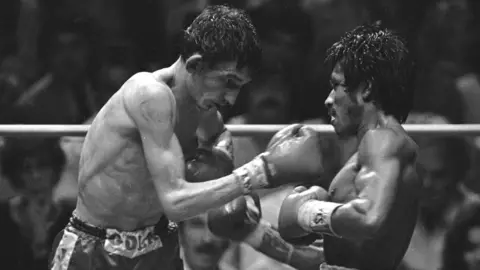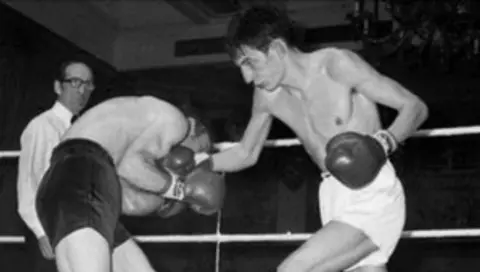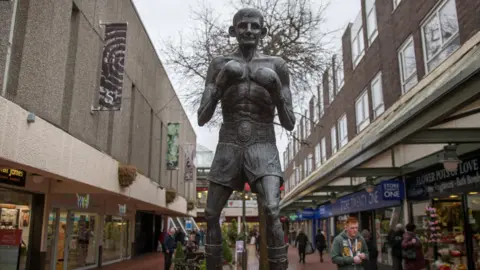Remembering 'Merthyr Matchstick' Johnny Owen
 AP Photo/Randy Rasmussen
AP Photo/Randy Rasmussen"Johnny's legacy will be if you work hard, you can achieve anything. And nobody's got the right to tell you you can't do that."
Johnny Owen was the fighting pride of Wales but his career was tragically cut short when he died aged 24, having been knocked out in the ring months earlier, never to regain consciousness.
More than four decades after his death, he remains a legend in boxing, but very little is known about the man called the "Merthyr Matchstick" - thanks to his tall, thin frame.
A new BBC Wales documentary shares the story of Johnny's life, of the fight that led to his death and the impact it had on those who loved him.
The programme, Johnny Owen - The Matchstick Man, hears from his family, friends, former coach and opponent of his last fight in Los Angeles in 1980, Lupe Pintor.
Johnny grew up in a three-bedroom-terraced house in Merthyr Tydfil with seven siblings and their parents.
"It was a bit cramped, but we all managed and got on fine. Back in the day that's what you did - you got on with it," said Johnny's brother, Kelvin Owens.
He started started boxing aged six in 1962 at the Merthyr Labour Club, with encouragement from his father.
"Mum didn't like boxing, she went along with it.
"Occasionally she would a sew little lead weight in the hem of his trunks to make sure he made the weight, otherwise he'd be too light."
His brother said that academically Johnny didn't do so well, but practically had "bags of common sense".
 PA Media
PA MediaThe Merthyr man followed a gruelling training programme running nine miles a day in heavy boots over the challenging local terrain.
His coach Dai Gardiner described him as "relentless" with "unbelievable stamina".
"I've trained British, Commonwealth and European champions and two world champions. I've never seen a boxer like him ever before, or ever again".
He had 25 wins from 26 professional fights, his only defeat a highly controversial points loss to Juan Francisco Rodriguez in Spain that he later avenged in Wales.
"He didn't like fame and being made a fuss of - he didn't like attention. He just wanted to do well in his boxing," remembered his brother.
Johnny continued to work as a machine-setter in a local factory when he turned professional, and kept that job until after he won the British title.
The boxer eventually bought a local shop where his mum worked.
"All John's professional career was about that he wanted to earn enough money to be able to look after my parents."
 Getty Images
Getty ImagesFrom his achievements in the ring, Johnny became a local hero.
"Johnny was the hope for the valleys...We were all proud of him. Everybody from south Wales [was]," said his friend, Jean.
In 1980, Johnny Owen fought defending world champion Mexican Lupe Pintor in Los Angeles for the WBC Bantamweight title.
One hundred people from Merthyr travelled to the States to support him.
He died six weeks later after suffering brain damage from being knocked unconscious during the match.
"Never got over it. Just learned to live with it. Never got over it, ever, none of us will," said his brother Kelvin Owens.
Johnny's father travelled to Mexico to meet Lupe Pintor to invite him to unveil his son's statue in Merthyr, which he attended in 2002.
Lupe Pintor said: "For me Johnny Owen was a hero."
Legends of Welsh Sport: Johnny Owen - The Matchstick Man is available to watch on BBC iPlayer and BBC One Wales from Tuesday, 21st January at 22:40 GMT and later on demand.
